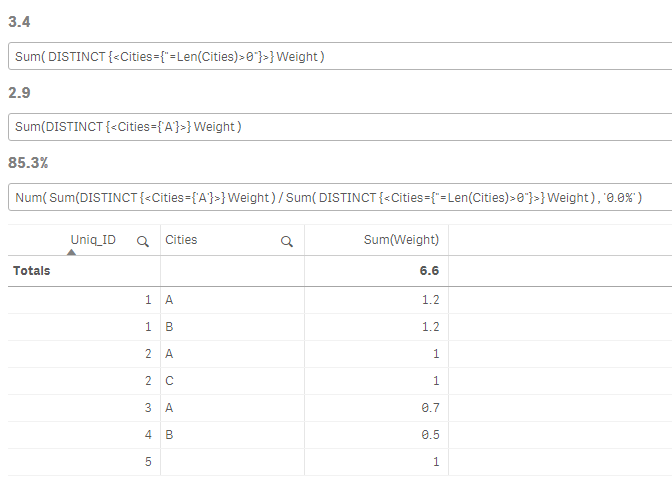Unlock a world of possibilities! Login now and discover the exclusive benefits awaiting you.
- Qlik Community
- :
- Forums
- :
- Analytics
- :
- New to Qlik Analytics
- :
- Calculate using 'only'/'distinct'
- Subscribe to RSS Feed
- Mark Topic as New
- Mark Topic as Read
- Float this Topic for Current User
- Bookmark
- Subscribe
- Mute
- Printer Friendly Page
- Mark as New
- Bookmark
- Subscribe
- Mute
- Subscribe to RSS Feed
- Permalink
- Report Inappropriate Content
Calculate using 'only'/'distinct'
I have a set of data with respondents choosen a city the like to visit.
Every respondents has an ID and a weight which I'mt using for calculation.
The data file look like this ( and the results I like to produce in Qlik at the bottom):
I like to measure how in percent as choosen City A, City B ect. - but only out the ID's who has choosen a city.
I have done the calculation at the bottom: 2.9 hos choosen City A (the wieght added up from ID 1, 2 and 3). Using this Expression I can calculate the number in qlik sense:
=Sum(Aggr(Only([weight]), Uniq_ID))
So far so good. But how do I calculate the total weight from the ID who has choosen a City (when that is done I can measure the % as I like). Id 5 will not qualify as he hasn't choosed any city. Therefor the total should be equal 3.4.
But how do I make the right expression?
Accepted Solutions
- Mark as New
- Bookmark
- Subscribe
- Mute
- Subscribe to RSS Feed
- Permalink
- Report Inappropriate Content
You don't need to use a variable at all. It is only used as a placeholder for the expression so the expression can be used in more than one sheet object/chart without having to rewrite the entire expression.
You can just as well add the entire expression into the expression property of the table:
Sum( DISTINCT {<Uniq_ID={"=Len(MaxString(Kommune))>0"}>} weight ) / Sum(TOTAL DISTINCT {<Uniq_ID={"=Len(MaxString(Kommune))>0"}>} weight )
The 100% is just a sum of all the row expression results which naturally will add up to 100% as it should.
- Mark as New
- Bookmark
- Subscribe
- Mute
- Subscribe to RSS Feed
- Permalink
- Report Inappropriate Content
You don't need to use Aggr() at all - have look at this:

If your city has a null value instead of an empty string you have to replace =Len(Cities)>0 with =Not(IsNull(Cities))
- Mark as New
- Bookmark
- Subscribe
- Mute
- Subscribe to RSS Feed
- Permalink
- Report Inappropriate Content
Thanks for the answer which was very usefull.
But as I see it it will only make the calculation for City A.
I need an expression working for City B, City C ect. (all cities actually).
How do I that ?
- Mark as New
- Bookmark
- Subscribe
- Mute
- Subscribe to RSS Feed
- Permalink
- Report Inappropriate Content
Like this:

- Mark as New
- Bookmark
- Subscribe
- Mute
- Subscribe to RSS Feed
- Permalink
- Report Inappropriate Content
Hi Petter,
Thanks - this is still pretty new to my. I'm not sure how to deal with you're solution.
I makes a variable called v3 (egual 100%) ?
And how to deal with the expression:
sum(distinct{<Uniq_ID={"=Len(MaxString(Kommune))>0"}>}weight) /
sum(total distinct{<Uniq_ID={"=Len(MaxString(Kommune))>0"}>}weight)
- Mark as New
- Bookmark
- Subscribe
- Mute
- Subscribe to RSS Feed
- Permalink
- Report Inappropriate Content
You don't need to use a variable at all. It is only used as a placeholder for the expression so the expression can be used in more than one sheet object/chart without having to rewrite the entire expression.
You can just as well add the entire expression into the expression property of the table:
Sum( DISTINCT {<Uniq_ID={"=Len(MaxString(Kommune))>0"}>} weight ) / Sum(TOTAL DISTINCT {<Uniq_ID={"=Len(MaxString(Kommune))>0"}>} weight )
The 100% is just a sum of all the row expression results which naturally will add up to 100% as it should.